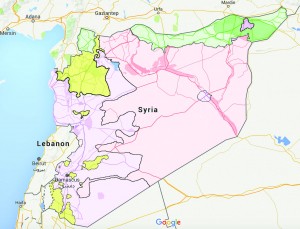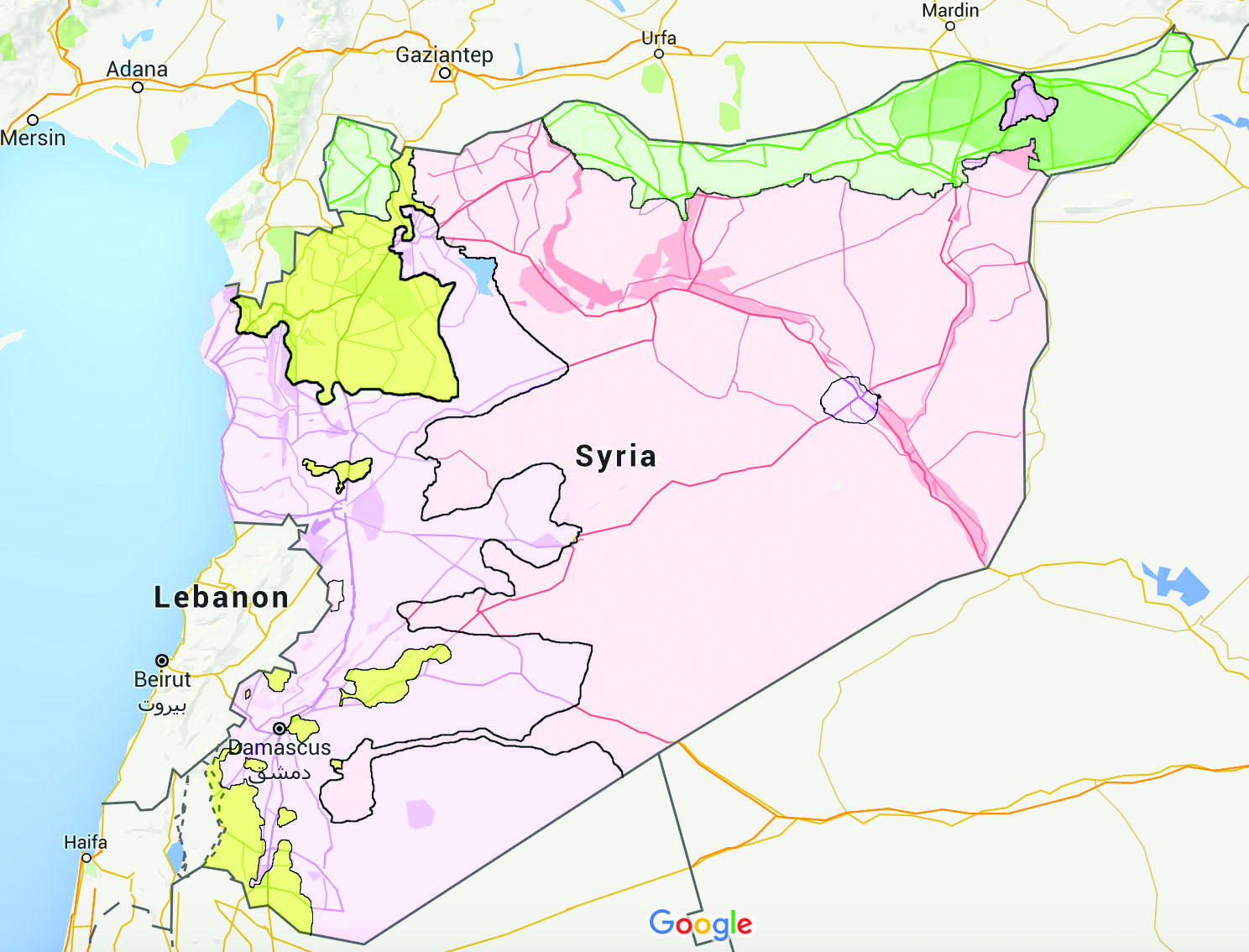By Cade Webb
Managing Editor

ISIS (Red): The Islamic State in Iraq and Syria (ISIS), commonly referred to as “ISIL” (Islamic State of Iraq and the Levant), or “Daesh,” is a jihadist extremist group seeking a caliphate. By establishing a caliphate, the group wants to create a singular Muslim movement and bring about a broad coalition by eliminating national boundaries. The group wants one Islamic state in the region and is beginning to create governing bodies in the land it has seized. Daesh brings in revenue by selling oil on the black market. It has been reported by CNN that Daesh brings in nearly $3 million per day in revenue from oil sales. Daesh has claimed responsibility for terror attacks across the globe, and is the only group involved in the war who has brought about attacks on countries not directly involved with the war.
Free Syrian Army (Yellow): The insurgency in the Syrian Civil War seeks to overthrow an oppressive regime led by the president of Syria, Bashar al-Assad. The FSA was established on July 29, 2011, by seven government officers and soldiers. After killings of protesting civilians, the group established a goal to overthrow Assad. According to multiple reports, as of June 2015, the FSA has grown to at least 45,000 members. The FSA is essentially fighting for its cause by itself, with ISIS and the Syrian government both having challenged the FSA.
Syrian Armed Forces (Purple): The Syrian Armed Forces is the main force working on behalf of Assad. With an enlistment of nearly 12 million across all branches of the military, Syria has one of the strongest military forces in the Middle East. The Syrian military was at the forefront of the cause of the war when soldiers fired on protesters in Daraa on April 25, 2011. They have been criticized for the treatment of civilians in their own country as the regime was found to be using chemical weapons in the fight against the Free Syrian Army.
The Kurds (Green): The Kurds are a group of people inhabiting the mountains bordering Syria, Iraq, Turkey and Iran. They have been fighting for autonomy in Turkey for generations, and hope to establish a country for the Kurds to live. Inhabiting the northern part of Syria, they have encountered increasing attacks from Daesh who hope to take control of the land the Kurds currently inhabit. The majority of Kurds are Sunni Muslims, but live by a culture that is unique to the Kurds. Originally uninvolved with the uprising against the Assad regime, the Kurds were brought into the conflict by their continued efforts against Daesh.
Timeline of the Syrian Civil War:
March 15, 2011: Over 41,000 protesters gather in Damascus to demand government reforms and an overthrow of President Bashar al-Assad after inhumane treatment of six teenage prisoners in Syria.
April 25, 2011: Six thousand soldiers deployed to the southern city of Daraa. Soldiers fire live ammunition on protesters and go house to house searching for protesters. Soldiers arrest hundreds found guilty of protesting. Tanks are deployed and snipers are brought into the city.
May 5, 2011: Protesters suppressed and troops withdraw from Daraa.
May 24, 2011: It is reported that over 1,000 were killed in the April uprisings, according to the National Organization for Human Rights in Syria.
July 29, 2011: Free Syrian Army is founded by seven government officers and soldiers. The goal of the FSA is to bring down the Assad regime. As of June 2015, the FSA has grown to 45,000–60,000.
Jan. 2012: Assad begins using large-scale artillery operations against the FSA. Bombings take place in cities throughout Syria.
Sept. 6, 2012: Twenty-one civilians killed by Syrian Army bombings in a Kurdish neighborhood in the city of Aleppo.
Dec. 3, 2012: The first allegation of chemical weapons used by the Assad regime on its citizens is reported. Seven people were killed in Homs by an “unknown poisonous gas.”
Sept. 8, 2013: ISIS captures FSA stronghold of Azaz, creating prolonged tension between the FSA and ISIS.
June 3, 2014: Bashar al-Assad wins presidential election with nearly 89 percent of the votes cast. The United States dismisses the election as illegitimate.
Sept. 23, 2014: The United States begins airstrike coalition with other countries against ISIS in Syria.
April 2015: It is reported that there have been over 310,000 casualties in Syria directly caused by the war.
July 2015: U.S. Special Forces raid compound housing the ISIS “chief financial officer.” The raid produced evidence of Turkish officials having dealt directly with high-ranking members of ISIS.
Nov. 24, 2015: Turkey brings down a Russian warplane that allegedly entered Turkish airspace.






















